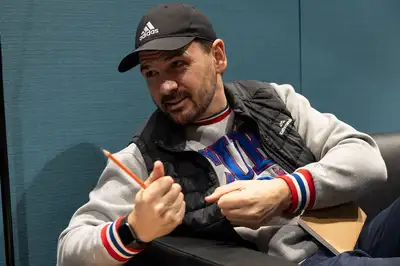
Dr Hona Black, Té¨hoe, Te Whánau a Apanui, Ngáti Té¨wharetoa.
Dr Hona Black, Té¨hoe, Te Whánau a Apanui, Ngáti Té¨wharetoa, is a Senior Lecturer in Máori knowledge at Te Pé¨tahi a Toi School of Máori Knowledge and has come full circle in the world of kura kaupapa. He first started as a pupil and now lectures on teaching for Máori medium schools. Between then and now, he attended Hato Páora College and later returned as a teacher and Head of te reo Máori there before returning to Massey to complete his PhD.
When heãs not lecturing, his research is focused on the evolution of the Máori language. His first book He Iti te Kupu: Máori Metaphors and Similes was followed by a second bilingual book Te Reo Kapekape, which literally translates to ãthe language of poking funã - something Dr Black says is becoming somewhat of a lost art.
ãGrowing up, humour was always used to ease tension, to uplift sadness and to bring a little bit of laughter to gloomy situations. Humour wasnãt reserved just for celebrations and happy occasions; it was woven into all aspects of everyday life.
ãToday, we are so caught up in life that we forget to see the humour all around us. Growing up in my family, if you were too serious all the time, you would be labelled a ãtou marokeã (a dry arse). These words are not insulting, but reflect Máori humour,ã he wrote in an for the New Zealand Herald ahead of Te Wiki o Te Reo Máori last year.
At the end of 2023, Dr Black received a Fast-Start Grant from Te Pé¨tea Rangahau a Marsden, the Marsden Fund for his research project: Kua kᨠtaku puku, ko te waha o raro kei te hiakai tonu: The de-sexualisation of te reo Máori domains.
He says English influence over the years has slowly eroded sexual language and humour because it was deemed rude, but it is completely different.
Using interdisciplinary methodologies, founded on tikanga Máori and kaupapa Máori, Dr Blackãs research will identify how sexuality was traditionally expressed and defined by examining extant literature, compositions and corpora such as harihari kai, pao, haka, pé¨rákau, ngeri and idiomatic expressions.
He will examine how sexuality is conveyed in more contemporary modes, performances and compositions such as those performed at Te Matatini, as well as interview te reo Máori experts to explore their perspectives on expressing Máori sexuality in both traditional and contemporary contexts.
ãI want to contribute to a body of mátauranga on te reo Máori and sexuality by investigating how sexuality, food, identity and socialisation are all part of a complex and interwoven Máori cultural worldview, and re-introduce these forms of te reo Máori, idiomatic expressions, and viewpoints back into everyday language.
ãThe language of sexuality in te reo Máori is currently dormant, so I hope to bring together these dynamic modes of mátauranga as valuable tools of expression of sexuality for current and future speakers and learners of te reo Máori.ã
Dr Black completed his PhD in te reo, which was an important distinction for him.
ãWriting in English wasnãt really a choice. Growing up only speaking te reo Máori, I appreciate the lack of resources for Máori to read things in te reo, and most of the audience I write for is Máori.
ãI find it easier to write in te reo because itãs my first language. Quite often itãs more intensive writing Máori things in English because youãre not just translating a language, itãs a worldview. Sometimes English canãt capture everything we want to say.ã
A key finding from his PhD was the difference in the te reo taught today, compared to how it used to be spoken.
ãWhen my nan was young, te reo came from the gut. The language and our emotions originate in the gut and come up through the mouth. Todayãs language comes from the head, so our kids do not know how to give tongue and cheek.ã

Dr Hona Black says he enjoys his mahi at Massey working alongside a great team.
Whánau affiliation to Massey
Dr Blackãs father, Taiarahia Black, became a Professor at Te Kunenga ki Pé¨rehuroa ƒéøïÆ¯å¤ and was the first person to ever publish a thesis in te reo Máori. His aunt, Dr Charlotte Severne, was a former Assistant Vice-Chancellor Máori and Pasifika for the university.
Dr Black says he enjoys his mahi.
ãI love my job. Weãve got a great team in Máori studies, and we have a really supportive boss Professor Hemi Whaanga, so itãs a great work environment and I wouldnãt want to be doing anything else.ã
Dr Black only speaks te reo to his young son, as does his partner who is non-Máori and has spent the past few years learning the language.
ãMy hope is that my boy grows up in a world where te reo Máori is spoken everywhere. As a kid I always remember people would look at you funny if they heard you walking around the supermarket speaking Máori, and they would stare. Today, itãs becoming much better, but I hope when my son grows up it is spoken more. I hope our ceiling becomes his generationãs floor.ã